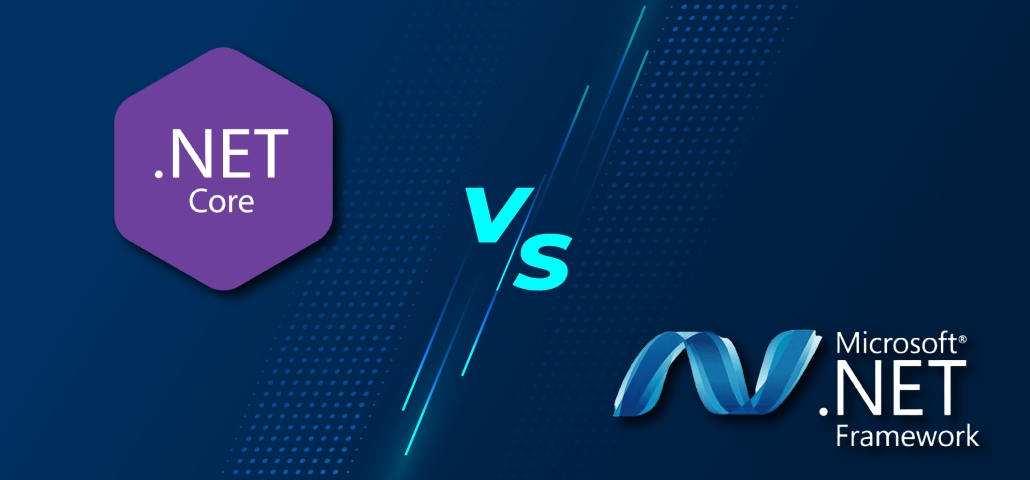.NET Core vs .NET Framework: Key Differences That Matter
 Admin
Admin Software Development
Software Development Jun 27, 2024
Jun 27, 2024

Table of Content

Priyanshi Patel
Priyanshi is a senior .NET developer with a keen interest in exploring the ever-evolving world of technology. After work, she dedicates her time to writing about the latest trends and advancements in .NET development, sharing insights on cutting-edge technologies and development practices.
20+ Years! That’s how long .NET has been around. It all started in the mid-90s, when Microsoft was looking for an alternative to Java (to gain a competitive edge). So they launched the first version of the .NET Software Development Framework in 2002.
As an initiative to simplify window application development, this new programming model supported 22 languages in total. While Microsoft's long-term goal was cross-platform compatibility, the initial .NET framework was limited to the Window environment.
Then, from 2002 to 2012, the.NET framework underwent constant updates and changes. However, in 2016, a significant shift occurred!
2014: The Beginning of the .NET Core Era
Microsoft announced .NET Core in 2014. It was released in 2016. .NET Core was a cross-platform framework that enabled the development of modern cloud-based applications. It was more lightweight and flexible than .NET Framework. It also supported cross-platform app development, including Windows, Linux, and MacOS.
NET Core vs NET Framework
After learning the basics, you may wonder if .NET Core is part of .NET software development framework or not. Well, it is definitely not a subset, but a completely new stack. However, you can still use the same languages (C#, F#, and Visual Basic) to write the codes. Let’s see what is .NET core and what is .NET framework to get a better idea.
What is .NET Core
.NET Core is an open-source development platform. It enables the development of various applications like mobile, desktop, web, cloud, IoT, machine learning, microservices, and games.
What is .NET Framework
.NET framework primarily runs on Windows. It consists of a common language runtime and an extensive class library. Thus, providing developers with reliable code for all major developments. One thing to remember here is that the .NET framework is not an outdated stack.
It still allows developers to use the tools, programming languages, and reusable elements to develop desktop, web, or mobile applications. So this was the basics of .NET software. However, you may still get confused about which stack to choose while taking help from .NET Software Development Company.
To help you decide between .NET software development platforms, let's first understand the difference between them.
NET Core vs NET Framework: Key Differences
#1: Open Source
.NET Core is open-source, allowing developers to view, modify, and contribute to its source code. This provides greater flexibility and community involvement.
In contrast, the .NET framework has some open-source components but is not fully open-source, limiting the same level of flexibility.
#2: Platform Compatibility
.NET Core is compatible with multiple operating systems, including Windows, Linux, and macOS. This cross-platform compatibility enables developers to create applications that run seamlessly on different systems.
On the other hand, the .NET framework is restricted to Windows, requiring significant efforts to migrate to .NET Core for cross-platform functionality.
#3: Installation
.NET Core can be packaged and installed independently of the underlying operating system, offering more flexibility in deployment.
Conversely, the .NET framework must be installed as a single package with runtime conditions specific to the Windows operating system.
#4: Shipping and Packaging
.NET Core is shipped as a combination of NuGet packages, which are zip files containing compiled code and related files.
This modular approach contrasts with the .NET framework, where libraries are bundled together inside the package.
#5: Application Type
.NET Core does not support desktop applications but supports other Windows universal applications.
The .NET framework, however, supports both Windows and web applications and is necessary for building Windows Forms or WPF applications.
#6: Security
.NET Core lack code access security features that prevent untrusted code from performing privileged actions but supports role-based security.
The .NET framework is considered more secure due to its inclusion of code access security features.
#7: Deployment
.NET Core offers a flexible deployment model, allowing updates to the latest version by creating new directories without affecting existing programs.
The .NET framework is deployed on Internet Information Services (IIS) when a new version is released, making it more complex for large-scale applications.
#8: Microservices and REST Services
.NET Core supports creating microservices via REST APIs and allows the use of various technologies and programming languages.
The .NET framework does not support microservices development but does allow the use of REST APIs.
#9: CLI Tools
.NET Core provides lightweight editors and command-line tools for all supported platforms, with the option to choose an integrated development environment.
The .NET framework, however, is heavy on the Command Line Interface.
#10: Mobile App Development
.NET Core enables cross-platform mobile application development through the Xamarin framework. This allows developers to build native mobile applications for Android, iOS, and other platforms using C# and .NET.
In contrast, the .NET framework does not directly support mobile application development. However, it provides a subset of its functionality through the .NET Compact Framework for mobile and embedded devices running Windows CE.
#11: Layout
.NET Core uses tag helpers for environment-specific configurations, such as different CSS links for development and production. This feature improves performance by using local resources in development and CDN resources in production.
The .NET framework uses traditional methods like "@Styles.Render" for including CSS files, which are less flexible and more verbose.
#12: Configuration Files
.NET Core uses "appsettings.json" for configuration settings, which is JSON-based and more user-friendly. JSON format is easier to read, write, and manage compared to XML. Thus, it allows multiple configuration options and prioritization, such as Azure Key Vault for secure storage of sensitive information.
The .NET framework uses "web.config", which is XML-based and can be more complex to manage, offering less flexibility in overriding settings compared to .NET Core.
These points highlight the differences between .NET Core and the .NET framework. However, the choice between them depends on your specific needs. While .NET Core may seem like the optimal choice for your business after reviewing the differences, it may not be true in every scenario.
Let's explore which option is best for your business.
NET Core vs. NET Framework: Which Option Is Best for You?
You may be thinking that .NET Core is the optimum choice for your business after looking at the differences. However, this may not be true in every scenario. Let’s find out which is best for your business.
When .NET framework is an ideal choice?
- Building an app to run on Windows alone.
- You're working on an app that already uses .NET framework (extending the application is a better option than migrating)
- You need to use third-party libraries or NuGet packages that .NET Core doesn't cover.
- You want to use Windows Forms and WPF applications
- You need to create a WCF service; .NET Core does not support this kind of service, so you'd have to make a REST API with ASP.NET Core MVC.
- You need to use an unsupported.NET Framework API..NET Core 2.0 bridges a lot of those libraries, but not all of them are covered yet.
- You need full support for VB.NET and F#, or if you need access to Windows APIs, such as WMI, Windows Registry, and other Windows-specific APIs.
When .NET Core is an ideal choice?
- You need to build applications that can run on multiple operating systems, including Windows, Linux, and macOS.
- High-performance computing tasks are essential
- Future-focused development is crucial, as Microsoft heavily invests in .NET Core, ensuring frequent updates.
- Open-source development is preferred
- Use .NET Core for new projects to leverage its modern features and cross-platform capabilities.
- You prefer a modular architecture that uses NuGet packages for libraries. It is easier to manage project dependencies and keep your application lightweight.
- Microservices architecture is a key consideration
- You are building cloud-based applications or using containers for deployment
Clear Your Doubts: Why Hire a .NET Developer?
Wrapping Up
.NET Software Development Company has been a top choice for businesses for a long time. In fact, .NET is considered to be one of the world’s most widely used development frameworks. So, this debate between .NET and .NET core is here to stay for a long time. However, the choice completely depends on what your project needs.
If you need support with .NET enterprise application development, we can be your trusted development partner. At Prioxis, we have helped many businesses successfully begin their journey in the .NET ecosystem. If you want successful project development using .NET, we can provide you with the right team. If you want successful project development using .NET, we can provide you with the right team.
Get in touch